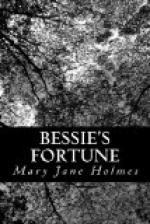She did not like Lord Hardy. He was just a fortune-hunter, she said, and cared no more for Augusta Browne than he did for her, except that Augusta was the younger of the two, and she could not forget how he had looked, smirking and mincing by the side of Archie’s wife at Aberystwyth; poor, weak Daisy, who, but for him, might not have gone so far astray as she did.
For Bessie’s sake Miss McPherson was almost ready to forgive poor Daisy, as she always called her now when thinking of her. For Bessie’s sake she felt that she could do a great deal that was contrary to her nature, but she could not feel kindly disposed toward Neil, for immediately after the receipt of her letter to his mother, containing two hundred and fifty pounds, and the announcement that she intended to take Bessie as her own child, Neil had written her a long, penitent letter, blaming himself as a coward, and telling of his remorse and regret for the past, and saying that, unless he was forbidden to do so, he should come to America in September, and renew his offer to Bessie.
This letter Miss McPherson read with sundry expressions of disgust, and then, taking from its peg her sun-hat, almost as large as a small umbrella, she started for the telegraph office, and several hours later Neil McPherson, in London, was reading the following laconic dispatch from Allington:
“Stay at home and mind your own business!
“Betsey McPherson”
“Perhaps I did wrong to send it, for maybe the girl likes him after all,” the spinster thought, as she walked back to her house.
But it was too late now, and for the next two or three days she was too anxious to think of anything except Bessie, who was much worse, and seemed so weak and unconscious of everything, that the physician looked very grave, and the clergyman came at Miss McPherson’s request, and said the prayers for the sick, but Bessie did not hear them, for she lay like one in a deep sleep, scarcely moving or seeming to breathe.
Before leaving the room the clergyman went softly to the bedside to look at the sick girl, wondering much at the likeness in her face to some one he had seen before, and wondering too why it should remind him of Hannah Jerrold, and the night when he went in the wintery storm to hear her father’s confession.
“Poor Hannah!” he said to himself, as he left the house, and walking slowly across the common to the church-yard, sat down upon a bench near to a head-stone, which bore this inscription: “Sacred to the memory of Martha, beloved wife of the Rev. Charles Sanford, who died January 1st, 18—. Blessed are the dead who die in the Lord.”
Since we last saw him, years ago, the Rev. Charles Sanford had grown an old man, though he was scarcely sixty-three, an age when many men are in their prime. There was a stoop in his shoulders as if the burden of life were heavy, and his hair was as white as snow, while upon his face was a look which only daily discipline, patiently borne, can ever write upon the human visage And patiently had he borne it, until he almost forgot that he was bearing it, and then one day it was removed and by the lightness and freedom he felt, he knew how heavy it had been.




